| |
Date |
Event(s) |
| 1 | 1850 | |
| 2 | 1852 | - 1852—1852: Tasmania ceases to be a convict settlement
- 1852—1852: Wells Fargo established in USA
|
| 3 | 1853 | |
| 4 | 1854 | - 1854—1854: Cigarettes introduced into Britain
- 27 Mar 1854—27 Mar 1854: Britain declares war on Russia (Crimean War)
- 25 Oct 1854—25 Oct 1854: Battle of Balaklava in Crimea (charge of the Light Brigade)
|
| 5 | 1856 | - 1856—1856: End of Crimean War
- 29 Jan 1856—29 Jan 1856: Victoria Cross created by Royal Warrant, backdated to 1854 to recognise acts
during the Crimean War (first award ceremony 26 June 1857)
|
| 6 | 1857 | |
| 7 | 1858 | - 1858—1858: 'The great stink' - smell of the River Thames forced Parliament to stop work
- 1858—1858: Royal Opera House opens in Covent Garden, London
|
| 8 | 1859 | - 1859—1859: Peaceful picketing legalised in Britain
- 25 Apr 1859—25 Apr 1859: Work started on building the Suez canal (opened 17 Nov 1869)
- 4 May 1859—4 May 1859: Brunel's Royal Albert Bridge opened at Saltash giving rail link between Devon
and Cornwall
- 24 Nov 1859—24 Nov 1859: Charles Darwin publishes 'The Origin of Species'
|
| 9 | 1860 | - 29 Aug 1860—29 Aug 1860: First tram service in Europe starts in Birkenhead
|
| 10 | 1861 | |
| 11 | 1862 | - 1862—1862: Lincoln issues first legal US paper money (Greenbacks)
- 20 Apr 1862—20 Apr 1862: First pasteurisation test completed by Louis Pasteur and Claude Bernard
|
| 12 | 1863 | - 1863—1863: Football Association founded (UK)
- 1863—1863: Opening of state institution for criminally insane at Broadmoor, England
- 10 Jan 1863—10 Jan 1863: First section of the London Underground Railway opens
|
| 13 | 1864 | - 1864—1864: A man-powered submarine, 'Hunley' sank a Federal steam ship USS Housatonic at the entrance to Charleston harbour in 1864 - the first recorded successful attack by a submarine on a surface ship
- 11 Mar 1864—11 Mar 1864: The Great Sheffield Flood - over 250 died when a new dam broke while it was being filled for the first time
- 20 Aug 1864—20 Aug 1864: Red Cross established - Twelve nations sign the First Geneva Convention
- 8 Dec 1864—8 Dec 1864: Clifton Suspension Bridge over the River Avon officially opened
|
| 14 | 1865 | - 1865—1865: Elizabeth Garrett Anderson (1836-1917) becomes first woman doctor in England [she later became the first woman mayor in England, in Aldeburgh 1908]
- 1865—1865: First concrete roads built in Britain
- 14 Apr 1865—14 Apr 1865: End of American Civil War - slavery abolished in USA
- 14 Apr 1865—14 Apr 1865: Abraham Lincoln assassinated in Ford's Theatre by John Wilkes Booth
- 15 Apr 1865—4 Mar 1869:
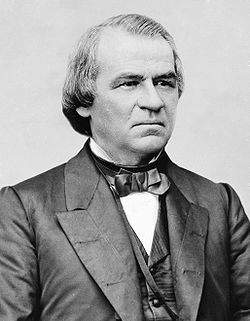 Andrew Johnson U.S. Presidency Andrew Johnson U.S. Presidency
- 5 Jul 1865—5 Jul 1865: William Booth (1829-1912) founds Salvation Army, in London
|
| 15 | 1867 | - 1 Jul 1867—1 Jul 1867: The British North America Act takes effect, creating the Canadian Confederation
|
| 16 | 1868 | - 1868—1868: Last convicts landed in Australia (Western Australia)
|
| 17 | 1869 | - 1869—1869: Ball bearings, celluloid, margarine, and washing machines, all invented
- 4 Mar 1869—4 Mar 1877:
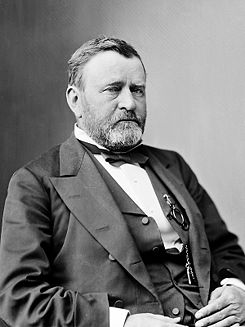 Ulysses S. Grant U.S. Presidency Ulysses S. Grant U.S. Presidency
- 23 Nov 1869—23 Nov 1869: Cutty Sark launched in Dumbarton
|
| 18 | 1870 | - 1870—1870: GPO takes over the privately-owned Telegraph Companies (nationalised)
- 1870—1870: Dr Thomas Barnardo opens his first home for destitute children
- 1870—1870: Water closets come into wide use
- 1870—1870: Diamonds discovered in Kimberley, South Africa
- 1 Oct 1870—1 Oct 1870: First British postcard - halfpenny post
|
| 19 | 1871 | - 27 Mar 1871—27 Mar 1871: First Rugby Football international, England v Scotland, played in Edinburgh
- 29 Mar 1871—29 Mar 1871: Opening of Royal Albert Hall, London
- 29 Jun 1871—29 Jun 1871: Trades Unions legalised in Britain, but picketing made illegal
|
| 20 | 1872 | - 1872—1872: Licensing hours introduced
- 1872—1872: Penalties introduced for failing to register births, marriages & deaths (Eng & Wales)
- 4 Dec 1872—4 Dec 1872: American ship 'Mary Celeste' is found abandoned by the British brig 'Dei Gratia' in the Atlantic Ocean
|
| 21 | 1874 | - 1874—1874: Factory Act introduces 56-hour week
- 5 Apr 1874—5 Apr 1874: Birkenhead Park opened, said to be the first civic public park in the world - features of it later copied in Central Park, New York
|
| 22 | 1875 | - 1875—1875: London's main sewage system completed
- 1 Jan 1875—1 Jan 1875: Midland Railway abolishes Second Class passenger facilities, leaving First Class and Third Class. Other British railway companies followed during the rest of the year. (Third Class was renamed Second Class in 1956)
|
| 23 | 1876 | - 14 Feb 1876—14 Feb 1876: Alexander Graham Bell and Elisha Gray each file a patent for the telephone - Bell awarded the rights
|
| 24 | 1877 | |
| 25 | 1878 | - 1878—1878: Edison & Swan invent electric lamp
- 1878—1878: Red Flag Act in Britain limits mechanical road vehicles to 4mph
- 1878—1878: CID established at New Scotland Yard
|
| 26 | 1879 | - 18 Sep 1879—18 Sep 1879: Blackpool illuminations switched on for first time
|
| 27 | 1880 | - 1880—1880: Education Act: schooling compulsory for 5-10 year olds
- 1880—1880: Mosquito found to be the carrier of malaria
- 2 Aug 1880—2 Aug 1880: Greenwich Mean Time adopted throughout UK
|
| 28 | 1881 | - 1881—1881: Postal Orders introduced
- 1881—1881: Flogging abolished in Army and Royal Navy
- 4 Mar 1881—19 Sep 1881:
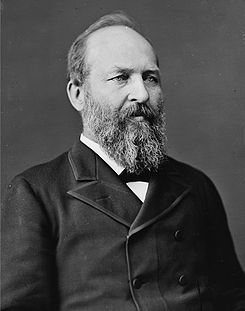 James A. Garfield U.S. Presidency James A. Garfield U.S. Presidency
- Sep 1881—Sep 1881: Godalming in Surrey became the first town in England to have a public electricity
supply installed (but in 1884 it reverted to gas lighting until 1904)
- 19 Sep 1881—4 Mar 1885:
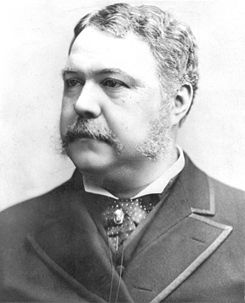 Chester A. Arthur U.S. Presidency Chester A. Arthur U.S. Presidency
- 26 Oct 1881—26 Oct 1881: Gunfight at OK Corral
|
| 29 | 1882 | - 1882—1882: Fourth Eddystone Lighthouse completed
|
| 30 | 1883 | - 1883—1883: Statue of Liberty presented to USA by France
- 24 May 1883—24 May 1883: Brooklyn Bridge, New York opens (crosses East River)
- 1 Aug 1883—1 Aug 1883: Parcel post starts in Britain
- 27 Aug 1883—27 Aug 1883: Eruption of Krakatoa near Java - 30,000 killed by tidal wave
|
| 31 | 1884 | - 31 May 1884—31 May 1884: John Harvey Kellogg patents corn flakes
- 13 Oct 1884—13 Oct 1884: Greenwich made prime meridian of the world
|
| 32 | 1885 | - 1885—1885: Carl Benz builds the 'Motorwagen', a single-cylinder motor car
- 1885—1885: Gottlieb Daimler patents the world's first motorcycle
- 1885—1885: Eastman makes first coated photographic paper
- 1885—1885: Canadian Pacific Railway completed
- Mar 1885—Mar 1885: First UK cremation in modern times took place at Woking
- 4 Mar 1885—4 Mar 1889:
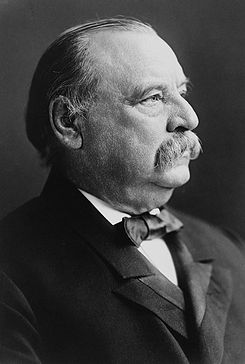 Grover Cleveland U.S. Presidency Grover Cleveland U.S. Presidency
- 5 Sep 1885—5 Sep 1885: The first train runs through the Severn Tunnel
- 29 Sep 1885—29 Sep 1885: First electric tramcar used at Blackpool
|
| 33 | 1886 | - 20 Jan 1886—20 Jan 1886: Mersey railway (under Mersey) opened by Prince of Wales
- May 1886—May 1886: Pharmacist John Styth Pemberton invents a carbonated beverage later named 'Coca-Cola'
- 29 May 1886—29 May 1886: Putney Bridge opens in London
|
| 34 | 1887 | - 1887—1887: Daimler produces a four-wheeled motor car
|
| 35 | 1888 | - 1888—1888: Convention of Constantinople guarantees free maritime passage through Suez Canal in war and peace
- 1888—1888: Jack the Ripper active in east London during the latter half of the year
- 1888—1888: County Councils set up in Britain
- 1888—1888: Dunlop invents pneumatic tyre
- 1888—1888: First box camera - George Eastman registers the trademark Kodak, and receives a patent
for his camera which uses roll film
- 20 Mar 1888—20 Mar 1888: Football League formed
|
| 36 | 1889 | - 1889—1889: Celluloid film produced
- 1889—1889: Dock Strike - docker's won their 'Docker's Tanner' 6 old pennies
- 4 Mar 1889—4 Mar 1893:
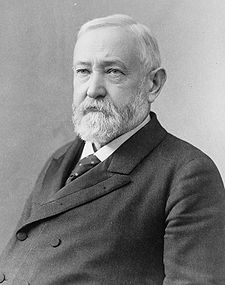 Benjamin Harrison U.S. Presidency Benjamin Harrison U.S. Presidency
- 31 Mar 1889—31 Mar 1889: Eiffel Tower completed (to mark centenary of French Revolution)
- 14 May 1889—14 May 1889: Children's charity NSPCC launched in London
- 3 Jun 1889—3 Jun 1889: Canadian Pacific Railway completed from coast to coast
- 28 Sep 1889—28 Sep 1889: Length of a metre defined
|



 Submit Photo / Document
Submit Photo / Document
